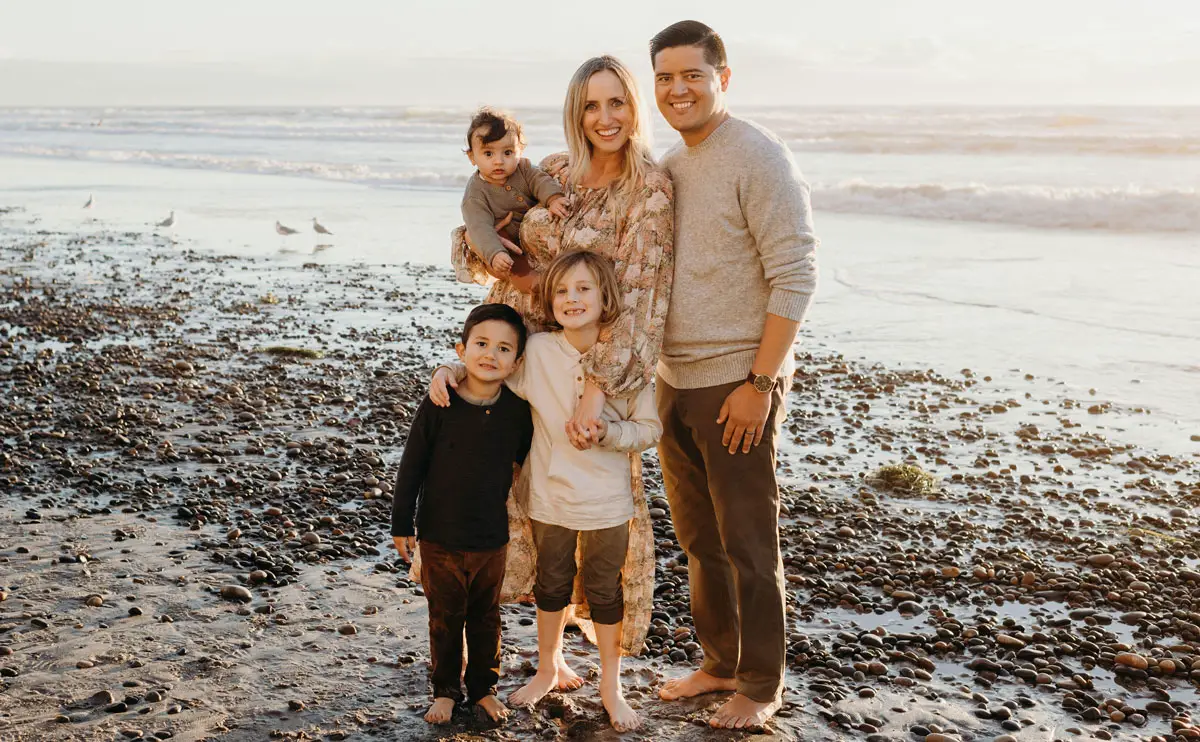ENCINITAS — A local family is urgently searching for a kidney donor to help restore a father’s quality of life, but they’re not alone.
According to Scripps, there are more than 110,000 people in the United States awaiting a life-saving organ.
Encinitas resident Curtis Choe, a 37-year-old dad of three young boys and husband to Alyssa, is one of those people. While he’s lived with low function in one kidney for several years, Curtis was forced into dialysis in January.
At least 10 of the Choes’ friends and family have at least applied as possible donors — one getting fairly far in the process — only to be later denied.
“Five to seven years is the typical wait time for someone needing a kidney transplant to receive a donated deceased organ,” said Steve Carpowich, public relations manager at Scripps Health. “That is one of the reasons we encourage living organ donation. Although the workup is dependent upon the living donor, the time to transplant is much shorter with a living donor.”
However, a living donor can help initiate a strenuous, critical medical process.
Now, the family is doing what they can to entice possible donors after the failed attempts. Last year, Alyssa launched the “Curtis’ Kidney Campaign” on GoFundMe, which was started to cover donor expenses not covered by insurance. So far, about a quarter of the more than $20,000 raised has been used.
According to the National Kidney Foundation, most people can live healthy, uninhibited lives with one kidney — as evidenced by the thousands of successful kidney donations recorded in the United States. A person may be born with one kidney, a condition called renal agenesis, or one functioning kidney, which is called kidney dysplasia.
There is a chance that kidney function may decrease, though, when there is one functioning kidney. This decline may take 25 years to appear if the person was born with a condition.

When he was 25, Curtis was diagnosed with gout. After a series of tests, doctors discovered only one kidney was functioning, a condition that may be genetic. His grandfather and mother both suffered from kidney issues, but by the time Curtis’ began to surface, it was not worth a diagnosis, he said.
“By the time I had found out about it, my kidney doctor said, ‘We can biopsy your kidney to try to figure out what it is, but the treatment won’t change,’” Curtis explained, adding that in order run a test, a piece of his kidney would need to be removed — worsening function. “So, we just decided that it wasn’t worth getting our diagnosis. We knew what we had to do regardless of whatever caused it.”
Curtis knew he would eventually need a transplant. So the couple, who galavanted around Europe admiring wine and pasta on their honeymoon, took action and cleaned up their diet.
For eight years, Alyssa said her husband was able to monitor his kidney disease with his nephrologist. Then, in August 2020, finding Curtis’ single kidney functioning at 12% “his doctor said OK, we’ve got to gear up for this,” Alyssa said. “It was just quickly dropping like every six months, it was dropping like another like one to 2%. So, at that point, we knew like, OK, this is going to have to happen sooner than later.”
First, Curtis’ two older sisters and parents got tested at the Scripps Health transplant center.
“And all of them, long story short, have been denied for one reason or another,” Alyssa said.
By January 2022, Curtis’ kidney function was down to 8% triggering the need for dialysis. Now, every day for five hours Curtis must undergo treatment while they await a positive donation.
Getting evaluated for a kidney transplant is strenuous, and getting approved is no small feat for either the donor or the receiver of the organ. There are forms to fill out and stages to pass. Someone could be approved to donate an organ, however, just not to Curtis — or a specific individual.
“Our friend, she just recently got denied, which we were super bummed about because she is the same blood type as my husband,” Alyssa said. “So that one was pretty, pretty defeating.”
However, people keep stepping up for Curtis — who doesn’t believe his story is worth an article in a newspaper.
One of the Choes’ friends, Curtis’ best friend from high school, is currently headed in a good direction at the transplant center, Alyssa explained. The donor has Type A negative blood, and while Curtis has Type O positive the two may be eligible for a paired exchange.
If a donor is incompatible with a recipient but eligible to donate, the pair can be matched with another set of patients for a swap. In this procedure, a living kidney transplant may be compatible with another person on the waitlist. This is called a paired exchange as it is another tool to help fill the need of organ recipients.
“Nothing has happened yet,” Alyssa said. “We thought that the paired exchange would happen pretty quickly. We thought it might be last year, before the end of the year, and here we are still waiting.”
While he is fortunate enough to do treatments at home, it’s time-consuming, and he has a young family. Bentley, 6, Kingston, 4, and Lennon, 1, keep the couple running around, which has been an outlet.
“There’s always somebody that needs something but that’s just what keeps us just moving,” Alyssa said.
Life around the Choes doesn’t stop, and they don’t intend to either.
Alyssa and Curtis are optimistic, despite his pain. But it is what it is, Curtis said.
“I know that we’re going to get through this,” Alyssa said. “We’re really in the trenches right now. We’re dealing with this but it’s not always going to be like this. We’re going to look back on this and be like, ‘Oh my gosh, can you remember those couple of years and we survived?’”
More information on organ donors and transplant surgery.




1 comment
Thank you Jacqueline. I appreciate you taking the time to share my family’s story. For those who may be interested in becoming a living donor, please visit:
https://www.scripps.org/services/transplant-services/living-organ-donation
Or call 858-554-4310
Comments are closed.